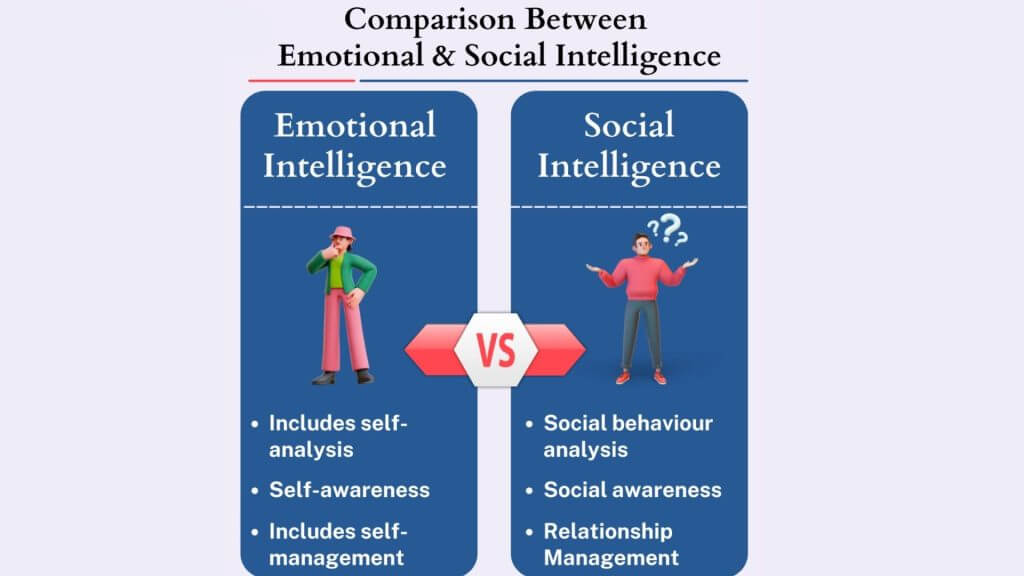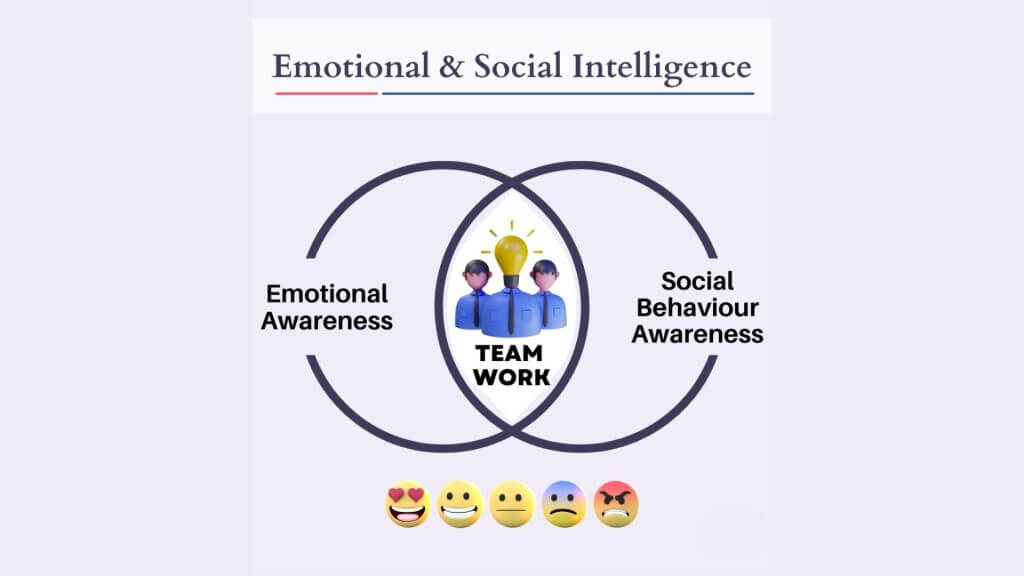
We send you all things hot & interesting from 200+ skill domains in to our community.

First came regular intelligence (I.Q.). Next came emotional intelligence a.k.a EQ. Then came social intelligence or S.Q. We know what social IQ is but let’s understand social intelligence vs emotional intelligence better through this blog.
With the evolution of humans, the need to categorize intelligence has come up. Why? Because ‘intelligence’ in itself has many perspectives and dimensions. Who you may perceive to be “dumb” may be intelligent in some other way. Modern science explains E.Q. and S.Q. as two of the most prominent categories.
Let’s understand better what emotional intelligence vs social intelligence
Emotional intelligence was conceptualized by famous psychologists like Daniel Goleman and Michael Beldoch. The theorists identified various principles of emotional intelligence (more on this later). They derived that emotional intelligence helps in recognizing and managing emotions.
Emotional intelligence skills are one’s ability to acknowledge and control emotions. The emotions could be their own or someone else’s.
With a careful assessment of emotions, emotional intelligence nurtures a trustworthy environment. It builds empathy for more social and political awareness. Plus, emotional intelligence in the workplace has been noted to leverage diversity in work cultures. It paves the path for powerful skills like:
-leadership
-change management
-influence
-cooperation
-and conflict management
Know more about how emotional intelligence can bloom your business.
The social intelligence concept was derived by Edward Thorndike, a psychologist. His research from the early 20th century set the path for social intelligence. It was further developed by Daniel Goleman and Howard Gardner.
According to Gardner, intelligence is a spectrum with many streaks. Two of these are interpersonal and intrapersonal intelligence. Gardner further explained the definitions of these two types:
This includes analyzing other people’s:
-moods
-temperaments
-feelings
-sensitivity
-motivations
-the ability to work in a team together
Intrapersonal intelligence
This category mainly focuses on the “self”. The focus is on the person’s own:
-feelings
-sensitivity
-motivations
-self-reflection
-Self-analysis
Gardner’s social intelligence theory is similar to Daniel Goleman’s theory of emotional intelligence.
Goleman’s “Social Intelligence: The New Science of Social Relationships” studies the differences between these theories.
Goleman explains:
emotional intelligence is the analysis of one’s own emotions, and,
social intelligence focuses on the feelings and behaviors of other people.
Let’s know more about the various research done on E.Q. and S.Q.

Emotional intelligence is the ability to read emotions.
Social intelligence is the ability to tune into other people’s emotions and behaviors. It helps in analyzing how to provide the most effective response in a situation.
The postmodern world considers social intelligence vs emotional intelligence to be the future of business.
Here are some studies done on E.Q. and S.Q. that add to the theory claimed above.
A study was conducted by Lyle Spencer, an American entrepreneur and philanthropist. The objective was to find the role of ESI (emotional and social intelligence) in business. The study included managers of a Siemens global division. (Siemens had over 400 branches in 56 countries in the mid-20th century). The study compared star performers to average performers working in these branches. Star performers were those with average annual sales of $29.8 m. Average performers were those with annual sales of $17 m.
The study found that the difference in sales occurred due to ESI. There was no technical reason behind it.
Goleman, Richard E. Boyatzis, and Annie McKee further tested emotional and social intelligence. The three researchers compiled the data analyzed for years. It included 500 models from British Airways, Lucent, IBM, and PepsiCo.
The research aimed to determine what drove excellent performance in these companies. The capabilities were divided into 3 major categories:
-Technical
-Cognitive
-ESI (Emotional and Social Intelligence)
The study analyzed the difference between an average performer and an outstanding performer. The results established that:
-ESI is essential for higher output. The results were especially seen at higher levels where technical skills mattered less.
-85% of the difference was because of ESI.
Furthermore, Goleman’s studies emphasized that:
-ESI gave the ability to manage human emotions
-ESI taught employees to treat human relations wisely.
Howard Gardner’s book “Theory of Multiple Intelligences” (1983) is worth a read. It is an assimilated report on emotional and social intelligence. He defines emotional(intrapersonal) and social (interpersonal) intelligence as separate but codependent entities.
Goleman’s thorough study of emotional and social intelligence can provide detailed perspectives. His research believes in the leader-follower dynamic. According to Goleman, the leader’s behavior can leverage a “system of brain interconnectedness”. This means:
Effective leadership can inspire or degrade the abilities of the follower(s).
Hence, positive leadership can lead to the following:
-meaningful connections
-positive behavior encouragement
-inspiration required in the corporate sector.
This was a brief on the various research on emotional and social intelligence.
Bottomline:
Studies prove how emotional and social intelligence can boost business success. This is also why it’s vital to acknowledge E.Q. and S.Q. as essential aspects of development.
Now let’s look at the core principles of social and emotional intelligence.

Social learning is the ability to assess other people’s emotions and behaviors. Using social intelligence in reasoning, one can respond correctly. Below are the principles of social intelligence:
When a person is aware of other people’s behavior and emotions.
When a person can analyze other people’s core emotions and what may be causing them. Empathy can also evolve to empathic accuracy. Empathic accuracy is the ability to catch other people’s thoughts, intuitions, and motives.
The ability to listen with utmost attention to what the other person is sharing.
This is the ability to understand the web of relationships. It also covers the ability to manage and maintain relations in a social environment.
Understanding how to have smooth interactions whenever conflicts arise in challenging situations.
Interacting well, keeping in mind the needs of the other person. Being aware of what can trigger conflicts and avoiding them as much as possible.
Now let’s look at the core principles of emotional intelligence.
The emotional intelligence concept includes 5 fundamental principles. These principles are mentioned below in the list:
Being aware of your emotions and analyzing why you feel the way you do.
Managing emotions so that they don’t cloud your judgment. Analyse and address your feelings the right way. Ensure that they don’t overpower your decision-making skills.
Understand the emotions of other people to provide correct responses. Being emotionally intelligent means having a sense of emotions. You learn how to deal with them even when they are not your own.
Listen to what the other person is saying. Understand what their needs are, and act to provide an appropriate reaction. Analyze how they feel and what would soothe their nerves. This will build a trustworthy relationship.
Build a positive environment in a team. You can do this by assessing the emotions of individual team members and when in groups. Understand what motivates them and what discourages them. Create a positive team bonding that inspires the members to cooperate.
Try to understand the importance of emotional intelligence in depth. This will help you shape your professional and personal life better.
Want to be socially intelligent? Follow our tips below to build your S.Q.:
#1. View people as humans rather than as puzzles.
Don’t imagine people to be like chess pieces. Try not to picture them to be too complicated. Vision people as beings with tangled emotions. Once you untangle these, they are readable enough to analyze.
#2. Respect and empathy for human nature
It’s human nature to make mistakes, feel messed up, and not always perform their best. Acknowledge these “normal” things about human beings. Don’t react with aggression when you find someone making a mistake. Anger and aggression can only make things worse. Above all, don’t give ultimatums that they should NEVER make a mistake. They say to err is human. Memorize the saying and remember it every time you see a human error.
#3. Give space for unique perspectives
It’s okay not to agree with every person’s perspective. But don’t disregard someone’s perspective only because they differ from yours. It’s the unique perspectives that make the world move ahead. So, always leave a broad space for the uniqueness and queerness people to bring.
Emotional intelligence is how to sort the emotional chaos that can build inside you or others. Here are the top tips to be emotionally intelligent.
#1. Recognize behavior without judgments
Personal judgments are the biggest hindrance when it comes to being emotionally intelligent. Being aware of your emotions means you fully accept them. For instance, people may call anger a negative emotion. The truth is it’s neither negative nor positive. Emotions aren’t positive or negative. It’s the actions following these emotions that are negative or positive.
#2. Don’t let others’ emotions affect you
Most empaths and emotionally intelligent people face the most significant challenge:
They take in the energy (emotions) released by other people. Absorbing these emotions can hamper the emotional balance they build within themselves. Hence, be careful while analyzing a person’s emotions. Always maintain a wall that will keep you from drowning in your thoughts and feelings.
#3. Give yourself the freedom to be wrong
Just because you analyzed a person’s emotions wrong doesn’t mean you must be harsh on yourself. Keep trying until you succeed. Remove thoughts like “I am not able to understand their emotions. I am so daft”. Instead, focus on “I couldn’t analyze their emotions. Why is it so? And how can I get better?”